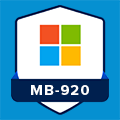
Duration: 2 Days
After successful completion of this MB-920 exam training course, candidates will be able to:
This exam covers the features and capabilities of Microsoft Dynamics 365 finance and
operations apps.
Candidates of this exam should have general knowledge of or relevant working experience in an
Information Technology (IT) environment. They should also have a fundamental understanding
of financial principles and business operations.
Identify general capabilities
Describe the Dynamics 365 Finance features
Describe Dynamics 365 Commerce capabilities
Describe core capabilities
Identify Project Operations capabilities
Describe reporting capabilities
A Microsoft Certified Trainer.
£899+VAT
Clientele ➞























Our Partners




